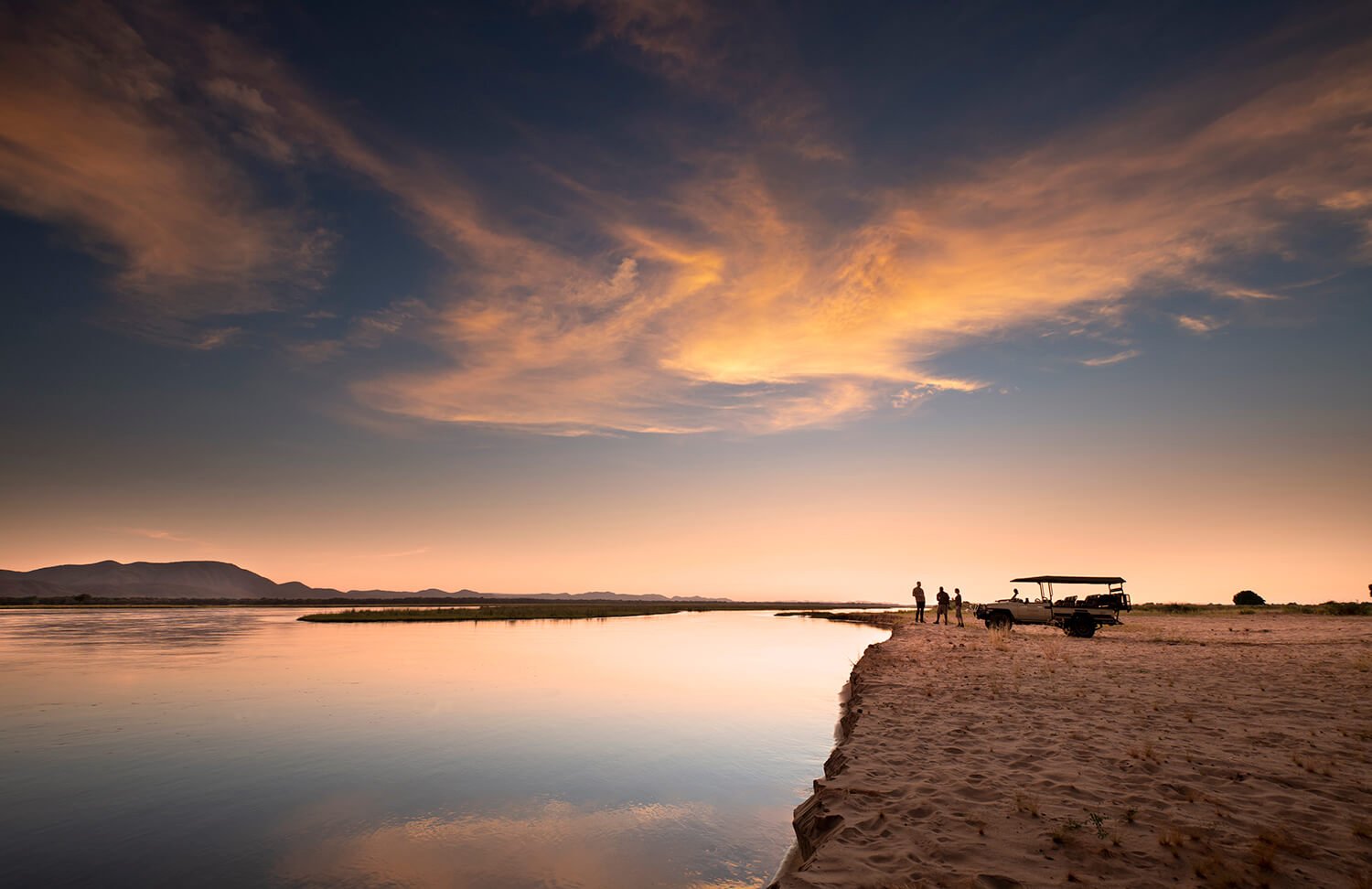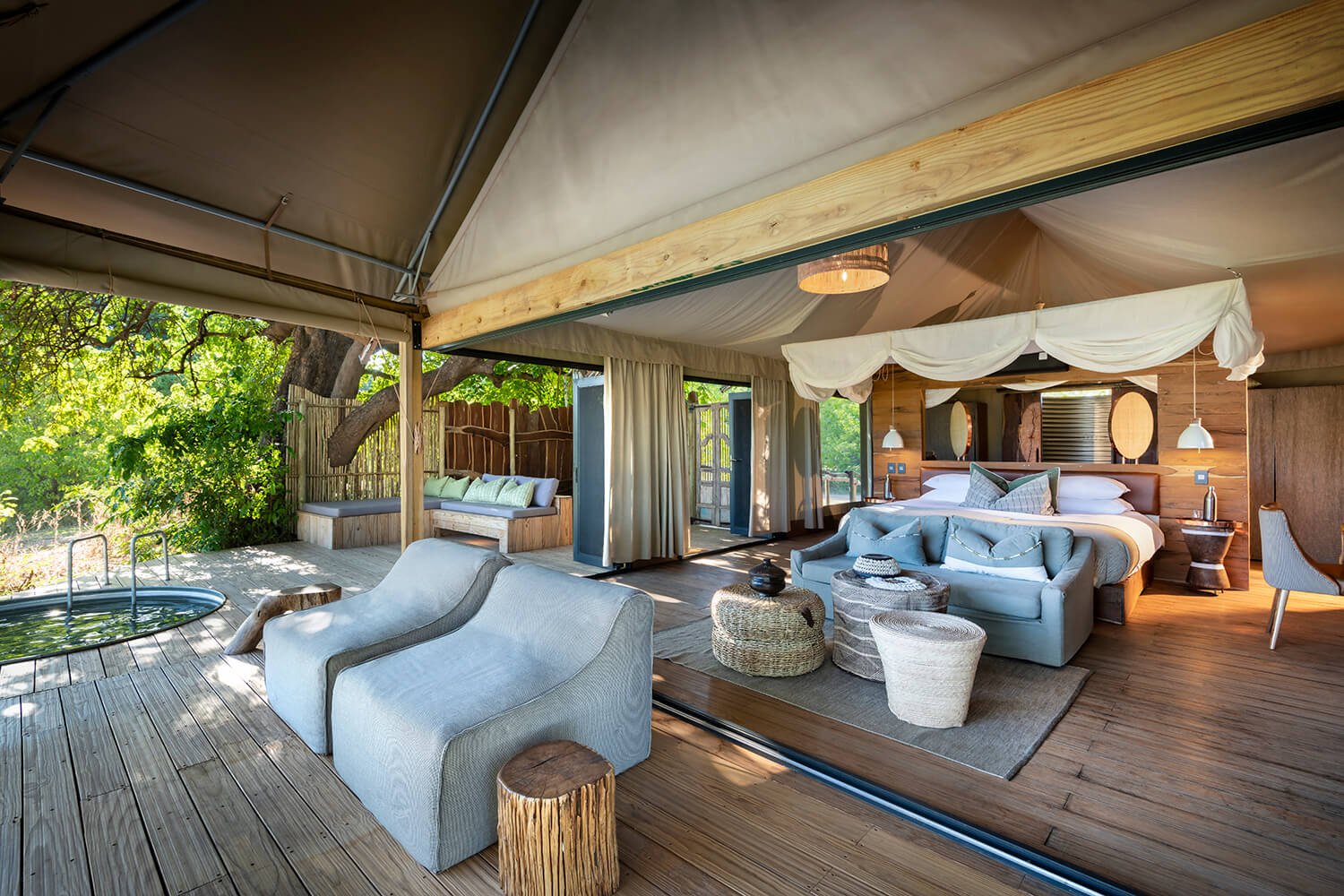Situated in the iconic Mana Pools National Park in the northern part of Zimbabwe, the luxurious Nyamatusi Camp offers unobstructed views of the Zambezi, one of the world’s oldest rivers.
Starting my journey at Cape Town International Airport, the direct flight to Harare International Airport takes only 3 hours and 10 minutes on Airlink’s exquisite Embraer 190. Waiting on the tarmac, the stunning new sunbird livery comes into view, setting Airlink apart in both looks and exceptional service from other airlines. With generous legroom, no middle seat, and a choice of aisle or window seat, passengers are in for a treat with delicious onboard snacks and a choice of beverages.
From the Bumi Hills airstrip, Halsted’s Aviation Corporation pilot Adriano flies me in the Safari Logistics Cessna Grand Caravan to the Mana Pools airstrip, where professional guides Tavengwa, affectionately known as TV, and Trymore collect me for my approximate 1-hour transfer to Nyamatusi Camp.

With woodlands, mopane forests, and open floodplains, Mana Pools National Park is a UNESCO World Heritage Site due to its pure wilderness and beauty. On the way to camp, we see a troop of vervet monkeys playing on a termite mound. A lone elephant bull approaches and they all scurry off in different directions, with one remaining hidden on the side of the termite mound to assess the situation.

Arriving at the main area well in time for lunch, the views over the Zambezi River are absolutely breathtaking. Nyamatusi Camp is one of African Bush Camps (ABC) Signature properties in Zimbabwe and is also their flagship eco-conscious camp. My host for the duration of my 3-night stay is Shepherd, who ensures that I am well taken care of.

My tented suite is a leisurely stroll from the main area and is stylishly decorated in shades of creams, whites, browns, and greys. The interiors were done in-house, with ABC founder Beks Ndlovu instrumental in most of the decisions. With a self-confessed soft spot for the Mana Pools area and the Zambezi Valley, he set out to ensure that the camp has every creature comfort imaginable while being fully solar-powered. Each room has its own private plunge pool for cooling off during those hot summer days.

From my outside deck, I gaze out over the Zambezi escarpment. Two shapes come into view, one big and one small. They are standing on a bank in the middle of the Zambezi – a mom and baby hippo. These mammals are inhabitants of the river and can be heard and seen from a variety of vantage points. Stopping for sundowners during one of our game drives, two hippos are engaging in what seems to be a territorial dispute, but it’s simply an adult and a youngster having a playful tussle.

With an abundance of trees, the region is undoubtedly a birder’s paradise. There are so many special sightings during my stay – a Saddle-Billed Stork, Spur-Winged Geese, a pair of Ground Hornbills, a Woodland Kingfisher, and an African Spoonbill to name a few. The most amazing sighting is of a breeding pair of African Fish Eagles sitting high in the treetops huddled together. TV informs me and fellow guests Nik and Simon from the UK that the larger of the Fish Eagle is not the male, but is in fact, the female. When the female has laid her eggs, she can incubate them more efficiently because of her larger wingspan.

TV decides to show us the magic of Mana Pools National Park on our last day. Mana means ‘four’ in the native Shona language, referring to the number of pools in the National Park. There is Chine Pool, which is the 4th pool, where we view the most interesting baobab tree that looks like it has a face. Long Pool, is named as such because it’s the longest of the pools, around 4,5 miles in length. Chisambe Pool, where the Tonga tribe used to bathe until Mana Pools was declared a national park in 1963. And lastly, there is Chisasiko Pool, a source of fishing, but with the thick mud in the water, the fish was inedible, so they got dried instead.

Having always wanted to see an elephant standing on its tippy toes since I first saw a photo of it back in 2017, and knowing that it occurs here, at Mana Pools, we all hope that today is the day. The TV suddenly stops the game drive vehicle and tells us to be quiet. Right in front of us is a very large bull elephant, feeding on a copious amount of greenery. “There is no guarantee that he will stand on his hindlegs – look how much food he has in his mouth,” TV whispers. We patiently wait, and just as we’re about to leave, an elephant known as Boswell pauses, and reaches his gigantic body up to stretch for the fruit pods on the tree he loves so much. What a once-in-a-lifetime sighting, to witness a 5-ton elephant standing on his tippy toes, in his natural environment, where he belongs.
For more information, or to book, visit www.africanbushcamps.com
*Views expressed are the author’s own.
How to Get There
Airlink is a privately-owned, independent premier regional airline offering the widest route network and connectivity to more than 45 destinations in 15 countries in Southern Africa. Experience More – https://www.flyairlink.com/profile/airlink-profile
With more than 60 regional jetliners in the fleet, Airlink has been ranked as South Africa’s most punctual airline, based on its 97% average on-time performance year to date. This is a clear indication of their determination and commitment to remain synonymous with customer centricity, punctuality, service excellence, and reliability.
Travelers can also enjoy the benefit of their intra-continental style business class service on select routes operating the magnificent Embraer E-190 / E-170 regional jets. Discover More – https://www.flyairlink.com/profile/airlink-profile#businessclass
How To Get There: Airlink operates direct flights from Johannesburg and Cape Town to Harare, Zimbabwe. https://www.flyairlink.com/destinations/flights-to-harare
Book direct on www.flyairlink.com, the FlyAirlink app, or your favorite Travel agent.

